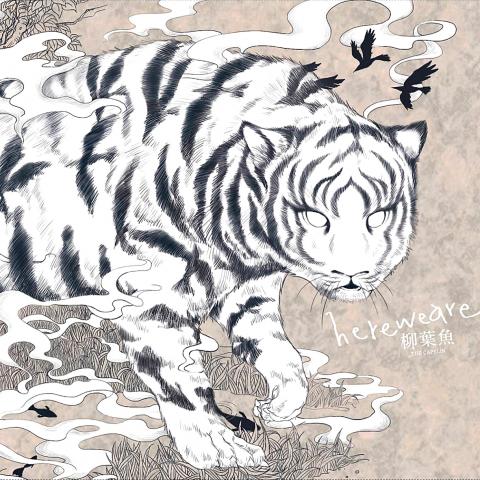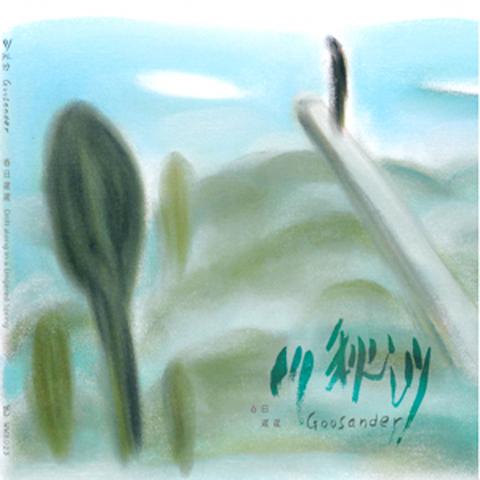The Capelin (柳葉魚) is a recent addition to Taiwan’s growing post-rock scene. The three-piece band has just released a six-track debut, Here We Are, a collection of instrumentals that balances straightforward rock and shoe-gazing jams.
In a short bio posted on its blog, the band says that its members like grunge, Brit-pop and post-rock, but adds a caveat you often hear from indie musicians: Why should the group be categorized or limited to one genre?
The opening track, New Game, might fool listeners with its intro, a three-chord progression that threatens to break into a feel-good rock song. But the voice that enters the picture is that of lead guitarist and songwriter Simpson Chien (簡銘宏), who leads the band through a melody that made me think of Guns N’ Roses’ Sweet Child O’ Mine.

But the hard rock is ultimately tamed by post-rock sensibility. The band alternates between loud and quiet sections, and the unexpected chord changes at the bridge create a sense of anticipation.
Another standout track, Discourse, follows a similar trajectory, paying homage to Neil Young with fits of guitar distortion that howl and whine and linger during quieter moments.
The album closer, Lots of Tigers (很多老虎), is a typical post-rock epic. The 21-minute track feels like several songs stitched together by a trippy vocal interlude and a noise jam in which Simpson uses his guitar to imitate the sound of singing whales.

The Capelin isn’t going to turn the post-rock world upside down with this release, and to untrained ears, the album will probably sound monotonous. But the group offers a refreshing take on a genre that doesn’t need lyrics to say something.
— David Chen
Not many young rock bands these days sing in Hoklo (commonly known as Taiwanese), which makes indie-pop group Goosander (川秋沙) stand out.

But that’s not all that sets this four-piece group apart. Lead singer Yvonne Ong (翁宜襄) has a siren’s voice with sensual qualities that bring to mind Kate Bush or Sarah McLachlan. Ong and her band seem to understand this, as this five-song EP is filled with dream-pop soundscapes that revolve around her breathy, whispery vocals.
Drift Along in a Lingered Spring (春日遲遲) is a snapshot of a band with a lot of potential. Ong’s voice is pleasing enough to the ear to forgive the somewhat awkward phrasing on the piano-driven Island (島嶼), the EP’s only track with English lyrics. But songs such as Goosander (川秋沙) show Ong and the band have room to mature: Her voice doesn’t fully mesh with the band’s lush arrangement, and she almost sounds off-key during quieter moments.
Ong’s voice works well with the piano, particularly on Stream (溪流). She coos gently throughout, yet manages to wield a stormy intensity that deepens the song’s reflective mood.

Falling Leaves (落葉), another strong track, moves swiftly with a post-punk dance groove and an atmosphere woven together by gauzy guitar distortion and spacey synth sounds.
The fact that Goosander sings in Hoklo is notable, given that the language has had a hard time shaking off its association with music of earlier generations, nakashi (那卡西) and traditional Taiwanese folk and pop. And unlike other indie bands that have used Hoklo in their lyrics, such as Loh Tsui Kweh Commune (濁水溪公社) and The Clippers (夾子電動大樂隊), Goosander appears eager to show that the language doesn’t just have to evoke a sense of campiness and ribald humor; it can also work in the reflective moods of indie pop.
More than that though, what is most noteworthy about Goosander is the unique sound that Ong and her bandmates have created.
— David Chen
Taiwanese diva Macy Chen (陳玫熹) makes her stunning jazz debut in the genre-blending After 75 Years, a dazzling musical tapestry.
Chen, previously a backup singer for pop stars and a vocal coach, left Taiwan in 2002 to sing jazz in New York.
The highlights on After 75 Years are the six 1930s Shanghai-era oldies that Chen reinterprets with jazzy flourishes. Chen takes Zhou Xuan’s (周璇) forlorn The Wandering Songstress (天涯歌女) and reimagines it as a proud declaration of feminism. She also takes Cui Ping’s (崔萍) originally melancholic Languishing Dreams (夢裡相思) and imbues it with a jazzy exuberance.
If these Shanghai oldies were originally anthems for the repressed gender, Chen has updated them with a modern, strong-minded feminine sensitivity.
With My Only Love (我唯一的愛) and Harlem Fantasia (哈林幻想曲), Chen takes American jazz standards and sings them in Chinese. Chen, who met her current husband in New York, expresses in musical terms how she found the two loves of her life in Harlem.
Not satisfied with merely putting a new spin on old yarns, the soulful crooner includes two self-penned compositions. In Fly Away (出走的決定) she sings of her decision to leave Taiwan and follow her dreams, and in Good Night, My Love (晚安,我的愛) she delivers a sweet-dream ode of love to her paramour against a soothing groove.
If Chen lacks the cuteness to make it as a pop singer, she certainly cuts a ravishing figure as a jazz diva. Her sultry voice has a full-bodied, charged quality that allows her to draw on a rich emotional vocabulary.
Another plus: The album’s extravagant packaging is designed by Grammy-nominated designer Xiao Qing-yang (蕭青陽).
— Andrew C.C. Huang
Mando-pop crooner Yoga Lin (林宥嘉) is gradually emerging as the most fascinating singer to have won the reality television singing competition One Million Star (超級星光大道).
On Perfect Life (美妙生活), his third outing, Lin serves as producer and song arranger and delivers a sophisticated, riveting album that contemplates what it takes to lead a beautiful life.
Lin’s dreamy, highly stylized vocals have a way of elevating even the most mediocre melodies to memorable gems. An unconventional pop song without an obvious chorus section, the lead single Good Night (晚安) is a modern-day lullaby, with Lin’s ambiance-drenched voice against exotic Hawaiian-sounding chords.
Freedom (想自由) is a contagious gem that deliberates the tension between commitment and freedom. Lin makes several forays into other genres. Wake Up (自然醒) and A Souvenir (紀念品) pay tribute to Brit-rock by juxtaposing Lin’s dreamy vocals against layered guitar riffs, while bonus track Fly My Way sees Lin flirting with disco dance beats.
Apart from celebrating tranquility and the fulfillment of dreams, Perfect Life dispenses wisdoms about the simple joys of waking up naturally in Wake Up and the necessity of solitude in I Always Practice Alone (我總是一個人在練習一個人).
The preorder edition of Perfect Life, available before the official album release, comes with a bonus live CD that includes a whopping 17 tracks of highlights from Lin’s Senses Around Tour (感官/世界巡迴音樂會) last year. The CD includes rare covers, such as a version of Elva Hsiao’s (蕭亞軒) Suddenly Thought of You (突然想起你) and Hong Kong crooner Anthony Wong’s (黃耀明) Beauty in a Glimpse (春光乍洩) among others.
— Andrew C.C. Huang

One of the biggest sore spots in Taiwan’s historical friendship with the US came in 1979 when US president Jimmy Carter broke off formal diplomatic relations with Taiwan’s Republic of China (ROC) government so that the US could establish relations with the People’s Republic of China (PRC). Taiwan’s derecognition came purely at China’s insistence, and the US took the deal. Retired American diplomat John Tkacik, who for almost decade surrounding that schism, from 1974 to 1982, worked in embassies in Taipei and Beijing and at the Taiwan Desk in Washington DC, recently argued in the Taipei Times that “President Carter’s derecognition

JUNE 30 to JULY 6 After being routed by the Japanese in the bloody battle of Baguashan (八卦山), Hsu Hsiang (徐驤) and a handful of surviving Hakka fighters sped toward Tainan. There, he would meet with Liu Yung-fu (劉永福), leader of the Black Flag Army who had assumed control of the resisting Republic of Formosa after its president and vice-president fled to China. Hsu, who had been fighting non-stop for over two months from Taoyuan to Changhua, was reportedly injured and exhausted. As the story goes, Liu advised that Hsu take shelter in China to recover and regroup, but Hsu steadfastly

You can tell a lot about a generation from the contents of their cool box: nowadays the barbecue ice bucket is likely to be filled with hard seltzers, non-alcoholic beers and fluorescent BuzzBallz — a particular favorite among Gen Z. Two decades ago, it was WKD, Bacardi Breezers and the odd Smirnoff Ice bobbing in a puddle of melted ice. And while nostalgia may have brought back some alcopops, the new wave of ready-to-drink (RTD) options look and taste noticeably different. It is not just the drinks that have changed, but drinking habits too, driven in part by more health-conscious consumers and

On Sunday, President William Lai (賴清德) delivered a strategically brilliant speech. It was the first of his “Ten Lectures on National Unity,” (團結國家十講) focusing on the topic of “nation.” Though it has been eclipsed — much to the relief of the opposing Chinese Nationalist Party (KMT) and Taiwan People’s Party (TPP) — by an ill-advised statement in the second speech of the series, the days following Lai’s first speech were illuminating on many fronts, both domestic and internationally, in highlighting the multi-layered success of Lai’s strategic move. “OF COURSE TAIWAN IS A COUNTRY” Never before has a Taiwanese president devoted an entire speech to